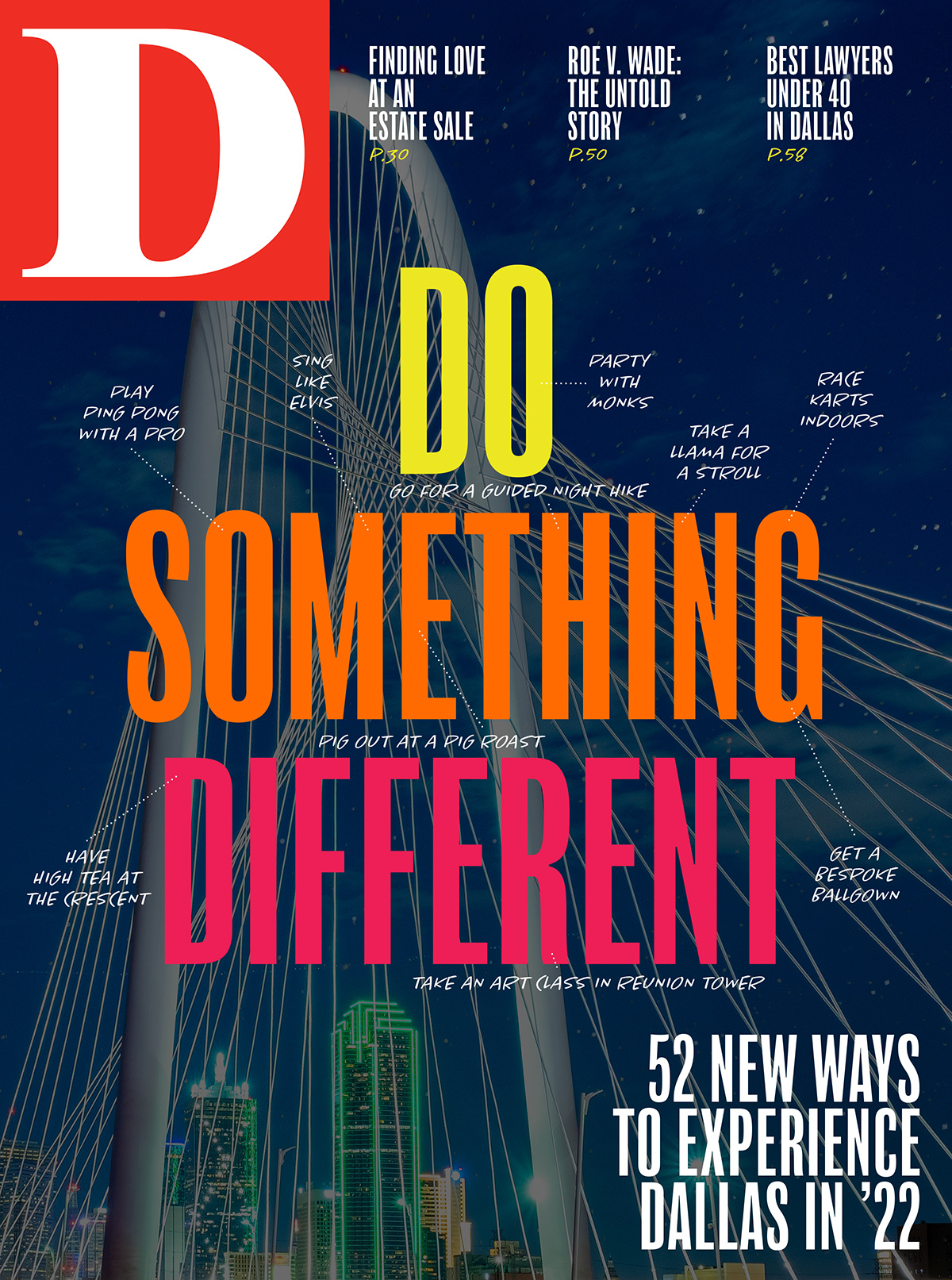When I think of estate sales, I think of my paternal grandmother, a woman whose love of Texas was so fanatical she requested to be buried holding a jar of jalapeños in one hand and a state flag in the other. She had both the jalapeños and the flag in her apartment among a vast sea of trinkets. I adored inspecting her collection of oddities: two coins from the Chicken Ranch, seven tattered copies of Gone With the Wind, a 19th-century lamp with a fringed shade. When she died at the age of 95, felled by a stroke on Cinco de Mayo, margarita in hand, the family took what meant most to us: unsorted family photos, letters my grandfather wrote during World War II, and the antique sofa my cousin and I spent hours sprawled on as kids. Her grandfather clock, now in my living room, chimes the time away in 15-minute increments.
We hired a company to offload what we didn’t want. I skipped the estate sale; I couldn’t watch her once-dear objects become discounted “finds” in the hands of strangers. It felt macabre and deeply sad. It took a new romance for me to give estate sales another try.
I started dating the professor last summer. He had been divorced for about a year, and the pandemic had hindered his efforts to de-bachelor his new house. He needed some framed art, pie tins, and steak knives.
“To murder me with?” I texted earlier in the week.
“Well, mine are too dull to do any real damage,” he replied, further nudging himself into my good graces. A man who would volley the joke must be safe, I thought.
Lying in his bed on a warm Friday night, I revisited our plans.
“You still want to go to an estate sale tomorrow?” I asked, thinking instead how pleasant it would be to walk around White Rock Lake or hit up the Arboretum.
“Sure. It’ll be fun,” he replied, and lulled by the warmth of his arm around me, my leg tossed over his, I couldn’t back out.
We’d met on the app that lets the woman make the first move—a mixed blessing at best for someone as lazy and ambivalent about dating as I am. Nevertheless, seven years postdivorce and spurred by the malaise of COVID-19, I figured it was time to get myself out there. I don’t remember what was in his profile, other than I found it charming. He was handsome, a professor with dark hair and a crooked grin. A three-hour phone conversation led to sushi, which led to an afternoon at the Angelika, which led to talking politics over dinners, which led to shared Spotify playlists, which led to us deleting our dating apps, which led to a Saturday afternoon estate sale on a lush side street of Preston Hollow.
We pulled up to a ranch-style house that stretched on for what seemed like an entire city block. Outside, weekend warriors, intent on finding a singular treasure among the picked-over porcelain figurines and yellowing women’s slips, lined up on the sidewalk. Pandemic precautions dictated a controlled crowd, and so the professor and I waited in the sun. I watched him chat with a woman ahead of us who explained that she frequented estate sales and that this particular sale was poorly organized and the wait was “just ridiculous.” The professor nodded, polite but noncommittal. I noticed the hair on his arms bleached blond from a recent hiking trip out West and leaned into him without thinking, curling both arms around his waist despite the heat. Only then did I worry that he might dislike public displays of affection. Instead, he wrapped his arms right back around me.
“Pie tins and steak knives,” he reminded me when it was our turn to go in.
“Dude, I’m just here to gawk at the house,” I responded.
When we walked into the foyer, I noticed an ornate chandelier with a sales tag dangling like a party decoration. I felt a perverse thrill, as if I were breaking and entering just to snoop through a fancy person’s closets. The house divided itself into little rooms, clearly designed before open concept was in vogue. Soft-focus landscapes in heavy gilt frames adorned the living room walls, and the built-in bar’s shelves held mismatched collections of brandy snifters and Champagne coupes. Floor-to-ceiling windows revealed a pool worthy of Hollywood’s heyday with old-fashioned chaise lounges resting at its mosaic edges. We wandered, holding hands, into an informal dining room awash in prints of midcentury modern graphics.
“I’d kill for this wallpaper,” I whispered to the professor, my voice low as if at a funeral, wondering if I could steam it from the walls and schlep it home.
“It’s pretty great, isn’t it?” he replied, and I internally clocked the shared love of bespoke kitsch.
On the kitchen counters, someone had carefully arranged silver serving dishes and large plates for deviled eggs beside tiny forks for oysters? Shrimp? Their purpose remains unclear. There were no steak knives, but we did find pie tins in a box on the floor of the laundry room.
We moved through bedrooms, a dressing room off the master bath, the garage smelling of dust and potting soil. Letting my fingers touch curtains or run over the backs of sofas, I tried to imagine these people’s lives based on what remained—boxes of books on oil and gas law, small silver trophies signaling first place in women’s golf tournaments, little ashtrays bearing the names of hotels on the French Riviera. Rich people things for sure, but intimate, so private they made me embarrassed despite being invited by the estate sale company to ogle these strangers’ things.
Just after my ex-husband and I had split up, I went to New York City alone. I wanted to see something old, something that lasted through time, and so on the first day I found myself in the furniture section of the American wing of the Metropolitan Museum of Art. I stood before a re-created historic bedroom with a bed of blue damask so dark that it seemed one-dimensional. I wanted to know who had slept in that bed. Had they been happy? I began to cry, leaning against the cool concrete walls of the museum. The guard’s hand on my arm startled me to my senses. “Ma’am, are you OK?” he asked. I nodded my head yes, though clearly the answer was no.
I had forgotten that trip, but the estate sale shook loose the memory. Wandering around that big house, I wondered if that couple had been happy. Looking at the professor as he thumbed through watermarked recipe books, I wondered, Would we be happy?
In the formal dining room, we paid for our items and hopped in the car, headed for coffee, my hand on his knee, pie tins and utilitarian flower vases clinking in the back seat.
A few Saturdays later, we hit another estate sale, this one in walking distance from St. Mark’s. The house’s exterior stood out, a mass of stone among homes in the shape of large white boxes. I waited for the professor in the driveway with coffees in hand, committing to memory how he took his—Americano, splash of milk—this little intimacy filed away for future mornings. He spotted me and waved, kissing me before reaching for his coffee and taking a sip. I noticed how elegant his fingers were and then felt embarrassed to be so deep in a teenage-esque crush that I would surely soon be streaming all of Taylor Swift’s oeuvre. I pulled up my mask and suggested we get inside before “all these other people get the good stuff.”
Seemingly designed by M.C. Escher, the house wound in a labyrinth of rooms connected by unnecessary stairs. We were greeted by large Christmas decorations, hanging tapestries from the Southwest, a pool table with blue felt, already sold. People hustled past us, brushing against our shoulders and backs while we meandered in and out of rooms that once held a family. We were on the lookout for art for the professor’s walls, something that could temporarily add some warmth to what he already had. We picked up a framed 17th-century print of an Italian street scene, the image mounted slightly off-center. A few weeks later, I would help him hang it in his living room, marking his space, ever so slightly, with my presence.
I anticipate more estate sales in our future, alongside the dinner parties and symphonies we have since attended. These sales seem less sad to me now. Or, rather, the sadness endemic to them seems more human, less devastating. Besides, with their help, the professor and I have collected a few things of our own in this early romance—a men’s toiletry bag, a few old books.
It’s too early to say if our lives will dovetail or split apart, if the clock I inherited from my grandmother will come to stand beside his lithograph of Pete Rose made by his great-
uncle. There are the profound complications of love in one’s middle age—families to be blended, kids and ex-spouses and parents, a Rube Goldberg machine of moving parts.
Still, I can’t help but wonder what will remain of our time together. The poster of Oracle Park in San Francisco I got him in honor of his beloved Giants making the playoffs, the speakers he bought me because “no one should listen to The Velvet Underground on her iPhone speaker,” the Italian print we hung together, even my ukulele, a relic of a relationship that had ended in heartbreak. One lazy evening, he absentmindedly plucked it off its stand on my wall. He noodled with it, tuning its woefully neglected strings until it sang sweet with melody. While he played, he told me stories about his college days, his long fingers at home with what was mine. There was something so delightful, so surprising, so guileless about his performance. It was the moment I knew I was in love with him, a new history to an old object.
Things are things, and yet the things we have, mundane or magical, are the totems of a life. I don’t know whether that ukulele will hang on a wall in our home, become a memory of something that almost was, or in 60 or 70 years end up as discounted treasure in a stranger’s hands. Either way, the moment lives on, like love does, immortal in its way, tender and human.



